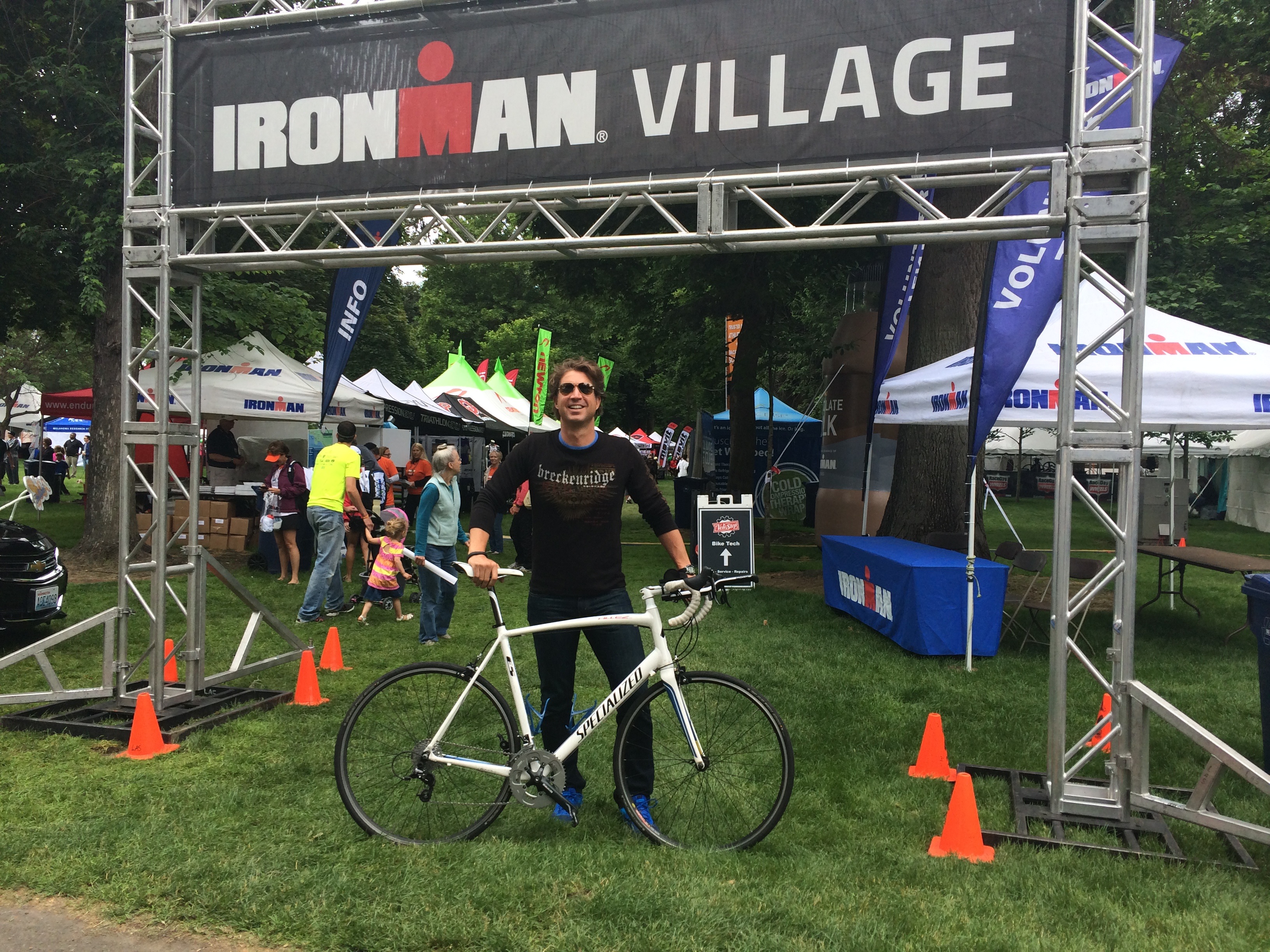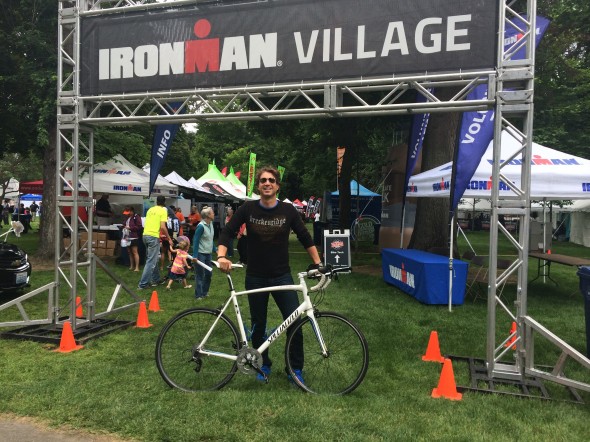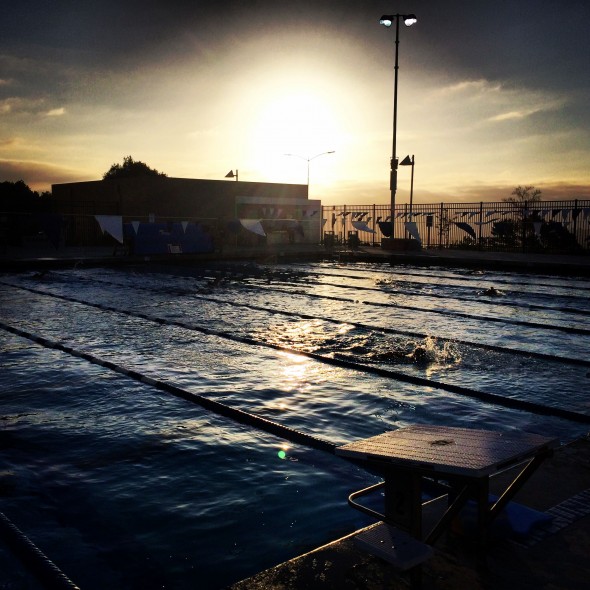The longer I wait at this point, the more I’ll forget. So I wanted to write down a hit list of all the things I learned throughout my process of training for an Ironman triathlon. This includes a list of things I learned in preparation for, and during, the event. It is ALL jumbled together. Good luck sorting it out.
My caveats:
1). My knowledge is limited. If you haven’t done an Ironman, I still might not have more knowledge than you. So go get your own info and test this stuff out. I am NOT an expert. I am an average dude who two years ago was 50 lbs overweight and had never even run a marathon. I completed Ironman Coeur d’Alene with VERY limited time to work out, and a VERY full time gig. I you’re debating whether you can do it, you probably can. The fat kid in me is cheering you on. I hope a few things in here I learned along the way help you out.
2. I have no idea from where I am puling this info at this point, b/c I read so much and asked questions of many along the way–and received great advice. So I am quite sure little of the below is original thought, it is stuff I either learned through personal experience, or more likely what I learned from others.
Here’s my list. In no particular order:
1. If you’re debating doing a triathlon, sign up and do it. Do not wait for some magical moment. Pick one reasonably far out, but not too far out. And just get going. Most shit doesn’t get done because people don’t ever really commit. The other reason shit doesn’t get done is that people commit and then fail to execute. So, it’s really this simple. 1. Commit. 2. Execute. Sorry, I really wish I could complicate it some more. But I can’t.
2. If you can get a coach, get one. (I didn’t). If not, be prepared to read, research, and do some trial and error. Learn what works with your body. Yes, my eyes rolled too when I hear people say that. But it’s true.
3. There are some great triathlon books, one I skimmed was something something triathlon something Bible. By someone. Or something like that. Just check out Amazon reviews and googling for great books. I did a ton of very rapid fire reading across the Inter-web, grabbed the stuff that made sense and passed on the rest.
4. Ditch some advice that doesn’t sit right along the way. If I’d listened to all the “experts”, I wouldn’t have made it through my training (got really sick w/ flu and couldn’t work out for three weeks about 12 weeks prior to IM, and several experts said if you miss more than a week of training altogether you should bail). Obviously, I didn’t listen to that portion of advice.
5. But generally heed advice of experts. I got way more good advice than bad. And ask a lot of IM’ers questions. Not just experts, even people that only did a few Ironman events–because sometimes their learnings and advice was markedly different, and in some ways equally as helpful, as the “experts.”
6. Nutrition is super killer key on race day. Begin prepping for this using your long training day and mimic what you’ll eat on race day–from when you wake up until the end of the day. Start this months prior to your Ironman.
7. My typical “long training” Saturday food consisted of: egg-banana-yam-baked-stuff (more below) around 5am…Getting your early calories in on IM day is CRITICAL, b/c when you’re out you’re largely out. Body can only process about 300 calories (incoming) an hour on the bike, and about 100 kCals (incoming) on the run. And that day you’re going to burn about 15-20k calories. So you’d better have a lot stored up. But don’t also overeat, esp prior to the swim. That can suck.
8. My Ironman breakfast thingy is this recipe: one can coconut milk, 12 eggs, 3 bananas, 1-2 (already baked) garnet yams, honey to taste + some splenda, and 1/2 cup to 1 cup coconut flakes all blended together and then baked into a loaf, meh 375-ish for 60-mins ish? It’s a great loading dose of protein, carbs, and fats. Super high calorie. NOTE, I didn’t eat ALL of this on training day. I’d make a loaf of it for the week and eat slices in the morning. I love this recipe. I might not have all the measurements right above, I pretty much just eyeball things and adjust to taste/consistency. You can opt out of the yams and it’s still great, but I like garnet yams.
9. Carbo-Pro + Cytomax were beverage staples of mine on the long bike ride (supplements to my water bottles). Other items: Honey Stinger waffles (not Paleo), dried fruit, almond butter and jelly sandwich on gluten-free bread (one before and midpoint on ride), bananas, and bonk breakers are the single best source of kCals I found for the bike.
10. Get a bento box for your bike. I didn’t even know what this WAS or that they even EXISTED up until 12 days before my Ironman. I learned it from a local expert (who REALLY IS an expert and amazing Ironman competitor).
11. Get fitted for your bike. It should be less than $100. Do this before you do all your training, or a lot of it. Do it even if you’re a month out. But don’t wait until you’re a month out.
12. Learn fundamentals and form for all three sports, particularly swimming. Join a Masters Swim program, but much better than that is to take a Total Immersion course. I would NEVER have finished the 2.4 mile swim without Total Immersion. Game changer for me. Two beat kick. If you don’t know what this is, it will CHANGE YOUR SWIM dramatically. And for the better. Google it.
12.5. (yes, I just did a 12.5) Join an Ironman Facebook group. Ideally, there is a group of people in a closed forum on Facebook for the event you’re participating in. I made some virtual friends that have turned into enduring ones, and learned a TON of great stuff along the way. And it was encouraging.
13. Check out Chi Running, 26.2 is a long time on your legs–esp after being in the water and bike for 8-12 hours (for us slow ones). It’s the training that wears your body out–so focus on form, and it’ll serve you on the day of the big event too.
14. The hardest part really isn’t finishing the Ironman, it’s finishing the consistent training required to get you to a level of fitness to do an Ironman. Yeah, the Ironman is a long day. And I am NOT at all undermining how hard it is to finish, there are probably a lot of Ironman finishers who would be pissed to think I’m suggesting otherwise. But, the Ironman is just one day. And it’s backed up, largely, by your training. Yes, IM day is a hard day. And amazing. And cathartic. But months of training are really what carry you. Though there’s a fair amount of mental mojo required on IM day too.
15. Create a checklist for Ironman day, and start working on it and putting stuff together a solid month out. You do NOT want to show up to your destination and have to figure stuff out or buy more things. I found checklists online. Look at a few of them then create your own or use one that looks solid. On that checklist, you should add one thing that will not be on any other checklists: do not get Gorilla Glue on your front brakes the night before Ironman (yeah, that happened).
16. If your IM swim is in cold water, you REALLY SHOULD do some cold water swimming beforehand. Your CNS, when cold water hits your forehead, will start to go into a state of shock. It’s very difficult to pull yourself out of this, your heart rate rises and you naturally start hyperventilating…this happened to me the 1st time I swam in the SF Bay (my first open water swim ever, four weeks prior to the IM). The temperature, open murky water, waves, along with a vigorous swim just creates a tough environment. I assumed this would happen to me, because I’d read about it. But I also believed that I would be able to talk myself through it. Which proved difficult to do. The only way I got adjusted was to get my body used to cold water swimming through frequency, and eventually my body got used to it. Plus, training in 52-55 degree murky SF saltwater was WAY tougher than a 62 degree lake swim (though the swim was in rough waters that day, wasn’t prepped for that).
17. Paleo. I’m a huge fan of Paleo. When I’m on the Paleo wagon, I feel as strong as a….Caveman (see what I did there?). But you’ll have to supplement, you need SOME carbs. I added white rice and white potatoes to my diet, and garnet yams–I eat those with almond butter all the time. And Taro bubble tea…because, well, Taro is a root, and somehow this is in someway tied to Paleo. And I love it. There, I said it. I love bubble tea.
Also–get your body fat down. Not too low, you need enough storage of kCals. But anything in excess is a serious penalty for your time, joints, etc. I was at about 9% body fat, maybe 9.5% on Ironman day, which was fine. In retrospect I wish I’d worked harder to drive down to about 7-8%, but I got as close as I could.
18. Do a triathlon or two before your Ironman. For me, the Ironman was my first ever triathlon. This is not the best idea, but apparently I am full of “not the best idea” ideas, and this was the way I wanted to do it.
19. Schedule everything. And I mean everything. And I got off schedule, of course. But having a schedule ensured I was more on than off. And kept me focused. When I got off schedule I simply revised my schedule. And I did nothing social for most of my training. I worked. A lot. I worked out. Some. I slept. Some.
20. Quit drinking. Yes, really. You don’t have to. But I felt like I ran a lot cleaner free of alcohol, and a big part of my training focus was maximization of efficiency. Drinking is overrated anyways.
21. When doing swim training, watch some Mandy McDougal videos on YouTube. Especially the one on breathing. You actually WANT to keep some air in your lungs, it’s what keeps you buoyant.
22. Wear two caps if you’re swimming in cold water. Ideally a neoprene one underneath your other cap.
23. Don’t add anything new 2-3 weeks prior to your IM. NOTHING. No new shoes, cap, wetsuit, bike, socks. Nada.
24. Get your bricks in, one a week. I don’t think you need to do more.
25. You can’t win on the swim. But you can lose on it. Make sure you get enough yardage in so that you can finish the swim comfortably.
26. BUT, after you’ve trained enough on the swim to know you can finish comfortably, spend as much time as you can on your bike. That bike is one long ass ride. Speaking of asses, yours will be in some serious pain at the end of the ride.
People asked me “so what’s it like to be starting a MARATHON after swimming 2.4 miles and biking 112 miles?” You know what the honest answer is? Ummmm, flipping AWESOME. Yeah. Awesome. To be able to run–even if you have to run a marathon–after being on a bike generating this condition called “raw butt” for 6-10 hours is simply unbeatable. After 112 on the bike, you will be THAT PSYCHED to be starting your run.
Not because you love running. But because at that point, you hate biking. Hate.
27. Supplement long rides with spin classes. I went to spin once or twice a week. And I did one long ride on weekends. That was the extent of my biking prep for most part. Could never get out of work in time to do a decent road ride during week. And I never did enough biking. This was my weakness.
28. Be prepared to wake early. I did a lot of my workouts from 5:00-7:00am. Did I mention you’ll have no personal life during your training time?
29. Pack a fresh change of clothes in your Bike to Run transition bag. Remember, I told you this list was going to be a combination of training tips AND in-race tips, and it’s totally mashed together? Sorry.
30. Use salt tabs on the bike ride, the ones without caffeine. Caffeine has a useful life of only about 4-6 hours. For energy and recovery I used a product I love called LifeShotz (note, I am one of their Advisors…also note, I do not care whether you use it or not).
31. Drop the glow sticks at the finish if you’re finishing at night on IM day, it’ll mess up your picture. 🙂
32. Start slow on race day. It is easy to burn through your glycogen fast and early. It’s a super long day, save it.
33. However, if you get to be a decent swimmer, do not start too slow. I thought it would be better for me to try to pace with the 1:15-1:30 group for the swim. Huge mistake. Because I am a bad swimmer? No. Because you will be situated with 1,000 other bad swimmers. Plus yourself. I could’ve swam a 1:10 pace, I should’ve swam with the 1:00-1:15 crowd. The 1:15-1:30 swimming crowd is like a bar fight at an irish pub.
34. Hydrate enough. But don’t over hydrate. But hydrate enough. 🙂
35. Yeah, it’s okay to pee in your wetsuit. When it is cold out, it also feels good. #truth
36. They also say it’s okay to pee on your bike. In my mind, this is only okay if you are attempting to do a sub-12 Ironman. #thatisalsomytruth There is something wrong about someone who is biking very slowly on the Ironman, to simply take a leak on said bike to save 30-seconds from stopping.
37. You can pee on the run in your shorts. But same applies above. Though, I will say that for my first marathon ever I missed a sub 4 by 33 seconds due to a last min bathroom stop. I still wish I’d peed in my shorts. But I can’t quite get the hang of this, plus I’m too vain.
38. Don’t overtrain. Seriously, two weeks out start tapering. And if you overtrain to point of injury then you’re in trouble. So train. Hard. Don’t overtrain. #seriouslydonotovertrain
39. CrossFit. I did this 2-3x/week as part of my training. I’m a fan. Not everybody is, but it’s changed my life. If you do CrossFit, though, do lighter weights and higher reps. And stop CrossFitting 1-2 weeks prior to your event, or if you go within days of the event use REALLY light weights and do not push yourself to the max.
40. Bodyglide for the wetsuit where you will chafe. If you forget body glide, you will pay the price around your neck that week.
41. Take a dramamine before your long swims, do it race day too.
42. Know how to change your bike tire. And make sure you carry at least two spares on race day, and one in your half way bag.
43. You need a day of rest. Pick a day and take it. Mine was a “floating” rest day during week. Not the best thing to do, but I needed to do it that way out of necessity. Better to pick a Monday and rest that day after a hard training weekend, or only do light active recovery stuff.
44. Get enough sleep. Nutrition and sleep are really vital throughout this entire process. You are taxing your body to high levels, you need to get reasonable sleep.
45. GU w/ amino’s for the run…I carry five with me for a marathon, one before it starts then one every 45-mins thereafter. And I alternate water and Gatorade at each of the stops.
46. On the bike, use higher gears and maintain a high cadence–about 90 RPM. Lower gears burn your leg muscles faster.
47. You will likely feel really bad during the Ironman. Expect this. And keep going. Or pull over to regroup. Just don’t stop permanently.
48. Did I mention yet that nutrition on race day is super critical? I wrote out my meal plan for training days and IM days MONTHS before the event.
49. Incorporate a protein drink into your daily workout life…I generally used whey at least once a day after tough workouts (SFH and GNC brands), but I also used a LifeShotz product called LS Vibe for recovery and overnight muscle repair.
50. During your Ironman, thank people. And say hi. I must’ve talked to 50 people during the event, and said hi to 500. Especially the volunteers. It motivated me, but also keep in mind these volunteers are just that–so extend some authentic appreciation. They’re giving up their entire day (plus days prep beforehand) so you can have your day. Thank them. I was really inspired by all the people there.
51. Carry ibuprofen. At mile 15 on the run, you will wish it were T3. Or even morphine. But, ibuprofen will do if you find yourself in a jam.
52. Remember, swimming is largely technique. Learn technique first, then you can limit your swim sessions. And focus on the bike.
53. Bank time on the bike (intentionally repeating myself). Get an indoor trainer to use if needed. The swim you can nail with good technique and limited hours in the pool. Biking time and performance and training also translates and carries over to the run. Running doesn’t help nearly as much with the bike. So if in doubt, train the bike.
54. Do a few Century rides prior to your IM. Note, I didn’t. The most I did in advance were a few 80-90 milers. If I had the time, and could do it again, I’d do about five 120 mile rides prior to the event. But if you can’t log that kind of time, no sweat. You’ll be fine. At least one Century would benefit you. There’s a big difference between miles 90 and 112.
55. Don’t get sick in training (again, sleep). DEFINITELY do whatever you can to avoid getting sick the week of your Ironman. I drank copious amount of elderberry syrup the week before the Couer d’Alene Ironman. And I stayed away from anyone that looked anything short of super healthy.
56. You’re going to hate it.
57. You’re going to love it.
58. Once you finish, you won’t be the same.
Enjoy the journey.
~Raz
No doubts, take Lasix only as prescribed by your doctor. Levitra is one of the best-known medications of all time. What is the most significant info you must study about levitra vs cialis? Most doctors say the effectiveness of Levitra is well documented. Absolutely, a sexual problem refers to a problem during any phase of the sexual response cycle that prevents the individual from experiencing satisfaction from the sexual life. Whilst sex is not vital for good heartiness, it�s doubtless significant for anyone. Why it happen? What kinds of professionals treat sexual diseases in men? A common class of antidepressants, which include Zoloft � can kill the mood in bedroom.














